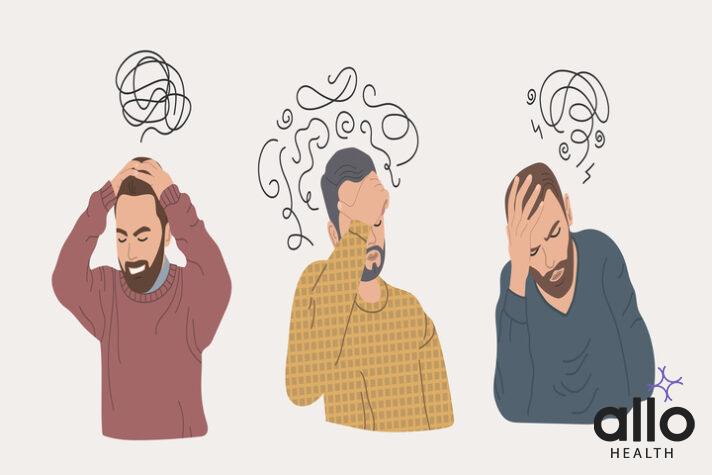Lonazep:Uses, Dosage, and Potential Side Effects

Allo Health is dedicated to personalized well-being, offering support and trusted information tailored to individual health goals. The platform emphasizes human-generated content, led by a distinguished medical team of experts, including physicians and sexual health specialists. Their commitment to credibility involves rigorous fact-checking, authoritative research, and continuous updates to ensure accurate, up-to-date information. Allo Health's unique approach goes beyond conventional platforms, providing expert-led insights and a continuous commitment to excellence, with user feedback playing a crucial role in shaping the platform's authoritative voice.

Dr Likhith earned a MBBS degree from Kharkiv National Medical University (Ukr, Eu) in 2019. He has hands-on experience in working within the healthcare domain & super specialty hospitals post completing his internship at St. Philomena's hospital, Bengaluru. His experience as a consultant physician in an Urban primary health centre led to his active involvement in various SORC camps under NUHM. He believes that sex education is one of the best investments society can make to promote sexual health with a positive attitude.
Why This Was Upated?
Our experts continually monitor the health and wellness space, and we update our articles when new information became available.
Updated on 17 April, 2024
- Article was updated as part of our commitment to diversity, equity, and inclusion.

"The following blog article provides information about a drug or brand name drug and its potential effects or benefits. However, it is crucial to understand that this information is intended for general educational purposes only and should not be considered a substitute for professional medical consultation. It is highly recommended to consult with a qualified healthcare professional before making any decisions regarding medication, treatment, or healthcare management.
Book consultation
Individuals have unique medical conditions, and the information provided in this article may not be applicable to everyone. Only a qualified healthcare provider can evaluate your specific medical situation, taking into account your medical history, conducting appropriate tests, and providing personalized advice and recommendations. They are equipped to make informed decisions tailored to your individual needs.
It is crucial to emphasize that self-diagnosis, self-medication, or disregarding medical advice can have serious health consequences. This article may reference specific brand names or drugs for illustrative purposes. Mention of these names does not imply endorsement, recommendation, or guarantee of their efficacy or safety. The choice of medication should be based on discussions and individualized guidance from a healthcare professional who has a comprehensive understanding of your medical condition.
"Lonazep, also known as Clonazepam, is a prescription medicine that belongs to the benzodiazepine family. It is primarily used to treat various medical conditions, such as seizures, panic disorders, and anxiety.
In this comprehensive guide, we will discuss the uses, benefits, and potential side effects of Lonazep, as well as provide answers to some of the most frequently asked questions about this medication.
What is Lonazep?
- Lonazep is a brand name for the generic drug called clonazepam, which is a type of benzodiazepine medicine used to treat anxiety disorders, panic attacks, and seizure disorders.
- It works by enhancing the effects of a neurotransmitter called gamma-aminobutyric acid (GABA), which helps to reduce the activity of the brain and nervous system.
- Clonazepam is a controlled substance and should only be used under the supervision of a healthcare professional, as it can be habit-forming and lead to dependence or withdrawal symptoms if misused.
How does Lonazep work?
- The drug, which contains the active ingredient clonazepam, belongs to a class of drugs called benzodiazepines.
- It works by enhancing the effects of a neurotransmitter called gamma-aminobutyric acid (GABA), which is an inhibitory neurotransmitter that helps to reduce the activity of the brain and nervous system.
- When clonazepam is taken, it binds to specific sites on GABA-A receptors in the brain, which increases the activity of GABA.
- This leads to a decrease in the activity of certain neurotransmitters in the brain, such as dopamine, acetylcholine, and noradrenaline, which are responsible for regulating mood, anxiety, and arousal.
- The increased activity of GABA also leads to the relaxation of muscles, reduction in seizures, and sedation.
- Clonazepam is also known to have anxiolytic (anti-anxiety) and hypnotic (sleep-inducing) effects.
- The exact mechanism of action of clonazepam is not fully understood, but it is believed to work by enhancing the opening of chloride ion channels in the GABA-A receptors, which leads to the hyperpolarization of neurons and inhibition of neurotransmitter release. This ultimately leads to a reduction in the excitability of neurons and the calming effects of the drug.
Lonazep should only be taken under the supervision of a qualified health provider, as it can cause sedation, impair coordination and cognitive function, and lead to dependence or withdrawal symptoms if misused.
Uses of Lonazep
The drug, which contains the active ingredient clonazepam, is a prescription medicine that is primarily used to treat anxiety disorders, panic attacks, and seizure disorders. Here are some more details about the uses of Lonazep:
- Anxiety disorders: The drug is commonly used to treat various anxiety disorders, such as generalized anxiety disorder (GAD), social anxiety disorder (SAD), and obsessive-compulsive disorder (OCD). It helps to reduce the symptoms of anxiety, such as restlessness, irritability, and excessive worry.
- Panic disorder: The drug is also used to treat panic disorder, which is a type of anxiety disorder that is characterized by recurrent panic attacks. It helps to reduce the frequency and intensity of panic attacks, as well as the associated symptoms, such as palpitations, sweating, and trembling.
- Seizure disorders: The drug is also used as an antiepileptic medicine to prevent and treat various types of seizures, such as absence seizures, myoclonic seizures, and tonic-clonic seizures. It works by reducing the abnormal electrical activity in the brain that causes seizures.

- Insomnia: The drug may be used to treat insomnia, as it has sedative and hypnotic effects that can help to promote sleep.
- Alcohol withdrawal: The drug may be used as a part of a detoxification program to treat alcohol withdrawal effects, such as anxiety, agitation, and seizures.
Dosage and Administration
The dosage and administration of the drug (clonazepam) will depend on the condition being treated, the patient’s age, weight, and overall health, as well as other factors such as other medications being taken. It’s important to follow your doctor’s instructions for dosing and administration carefully. Here are some general guidelines for the dosing and administration of the drug:
- Anxiety disorders: The typical starting dose for adults is 0.25 to 0.5 milligrams (mg) of the drug, taken two or three times per day. The maximum dose should not exceed 4 mg per day.
- Panic disorder: The typical starting dose for adults is 0.25 mg of the drug, taken twice per day. The dose may be increased gradually over time, up to a maximum of 4 mg per day.
- Seizure disorders: The usual dose for adults is 1.5 mg per day, divided into three doses. The dose may be adjusted depending on the patient’s response.
- Insomnia: The usual starting dose for adults is 0.5 mg of the drug, taken at bedtime. The dose may be increased to 1 mg if necessary.
- Alcohol withdrawal: The usual dose for adults is 1.5 mg per day, divided into three doses. The dose may be adjusted depending on the patient’s response.
The drug is usually taken by mouth, with or without food. The tablet should be swallowed whole with a glass of water, and should not be crushed, chewed, or broken.
It’s important not to stop taking the drug abruptly, as this can lead to withdrawal symptoms. The dose should be gradually tapered off under the supervision of a healthcare professional.
It’s also important not to exceed the recommended dose or take the drug for longer than prescribed, as this can lead to dependence or other serious side effects. Do not take a double dose of the medication to make up for a missed dose.
Monitoring

When taking Lonazep, it is important to monitor for any potential side effects or adverse reactions that may occur. Here are some of the tests that may be used to monitor for these effects:
- Liver Function Tests: Lonazep is primarily metabolized in the liver, so it is important to monitor liver function regularly, especially if the patient is taking high doses of the medication or has a history of liver disease.
- Blood Tests: Blood tests can be used to monitor the levels of Lonazep in the bloodstream and to check for any changes in blood cell counts or electrolyte levels.
- Kidney Function Tests: Lonazep can be excreted by the kidneys, so it is important to monitor kidney function regularly, especially if the patient is taking high doses of the medication or has a history of kidney disease.
- Cognitive and Behavioral Tests: Lonazep can cause drowsiness, confusion, and other cognitive and behavioral changes, so it is important to monitor for these effects, especially in patients who are elderly or have a history of cognitive impairment.
- Physical Examination: A physical examination can be used to monitor for any physical changes or side effects that may be related to Lonazep, such as changes in blood pressure, heart rate, or respiratory rate.
Side Effects and Precautions
Like any medication, Lonazep (clonazepam) can cause side effects, and precautions should be taken to minimize the risk of adverse reactions. Here are some of the common side effects and precautions associated with Lonazep:
Common side effects
- Drowsiness
- Fatigue
- Dizziness
- Ataxia (difficulty with coordination)
- Increased saliva production
- Dry mouth
- Constipation
- Nausea
- Blurred vision
- Memory impairment
- Withdrawal symptoms like tremors, and muscle pain
- Abdominal pain
Less common but serious side effects that require immediate medical attention
- Severe drowsiness or sedation
- Frequent mood swing
- Confusion
- Difficulty breathing or swallowing
- Unusual behavior or mood changes
- Suicidal thoughts or behaviors
- Allergic reactions (hives, rash, itching, swelling)
Not everyone who takes the medication experiences side effects, it varies from person to person.
Precautions
- Lonazep should not be taken by people with a history of hypersensitivity to benzodiazepines or to any of the components of the medication.
- Lonazep should be used with caution in patients with liver or kidney disease, as well as in elderly or debilitated patients, who may be more sensitive to the effects of the medication.
- Lonazep should not be used during pregnancy or while breastfeeding, as it can harm the developing fetus or newborn.
- Lonazep can interact with other medications, such as opioids, alcohol, and certain antidepressants, and should be used with caution in patients taking these medications.
- Lonazep can be habit-forming and can lead to dependence or withdrawal symptoms if misused. It should be used only as directed by a healthcare professional.
- Lonazep should not be stopped abruptly, as this can lead to withdrawal symptoms. The dose should be gradually tapered off under the supervision of a healthcare professional.
Talk to your doctor for medical advice about any existing medical conditions or medications you are taking before starting treatment with Lonazep. You should also report any side effects you experience while taking the medication to your doctor.
Interactions With Other Medications
Lonazep (clonazepam) can interact with other medications, including prescription drugs, over-the-counter medications, and herbal supplements. These interactions can affect how the medications work and may increase the risk of side effects.
It’s important to inform your doctor about all medications and supplements you are taking before starting treatment with Lonazep.

Here are some common medications that may interact with Lonazep:
- Opioids: Taking Lonazep with opioids, such as codeine, fentanyl, or oxycodone, can increase the risk of drowsiness, sedation, and respiratory depression, which can be life-threatening.
- Alcohol: Drinking alcohol while taking Lonazep can increase the risk of sedation and respiratory depression.
- Antidepressants: Some antidepressants, such as fluoxetine (Prozac) and paroxetine (Paxil), can increase the levels of Lonazep in the body, leading to an increased risk of side effects.
- Antipsychotics: Taking Lonazep with antipsychotic medications, such as clozapine (Clozaril) or olanzapine (Zyprexa), can increase the risk of sedation and respiratory depression.
- Antihistamines: Taking Lonazep with antihistamines, such as diphenhydramine (Benadryl), can increase the risk of sedation and respiratory depression.
- Muscle relaxants: Taking Lonazep with muscle relaxants, such as baclofen (Lioresal) or cyclobenzaprine (Flexeril), can increase the risk of sedation and respiratory depression.
- CYP3A4 inhibitors: Some medications that inhibit the enzyme CYP3A4, such as ketoconazole (Nizoral) and erythromycin (Ery-Tab), can increase the levels of Lonazep in the body, leading to an increased risk of side effects.
Inform your doctor of all medications and supplements you are taking before starting treatment with Lonazep, and to follow your doctor’s instructions carefully regarding dosing and administration.
You should also avoid driving or operating heavy machinery until you know how Lonazep affects you, as it can cause drowsiness and impair your ability to function.
Lonazep and Sexual Health
Lonazep (clonazepam) can have both positive and negative effects on sexual health, depending on various factors, such as the individual’s medical history, dosage, and duration of treatment.
Positive effects
- Lonazep can help reduce anxiety, which can improve sexual function for some individuals who experience anxiety-related sexual concerns.
- For some individuals with epilepsy or seizure disorders, Lonazep can help control seizures, which may have a positive impact on sexual health by reducing the risk of injury or other complications during sexual activity.
Negative effects
- Lonazep can cause sexual dysfunction in both men and women, including decreased libido, difficulty achieving or maintaining an erection in men, and difficulty achieving orgasm or decreased vaginal lubrication in women.
- Long-term use of Lonazep can lead to dependence and withdrawal symptoms, which can also have negative effects on sexual health, such as decreased libido and sexual dysfunction.
- Lonazep can also cause drowsiness, fatigue, and other side effects that may affect sexual health by reducing energy and motivation.
Talk to your doctor if you experience any changes in sexual function while taking Lonazep. Depending on the severity of the symptoms, your doctor may recommend adjusting the dosage, switching to a different medication, or adding a medication to manage sexual side effects.
Your doctor can also help you weigh the potential benefits and risks of Lonazep and help you make an informed decision about treatment.
Conclusion
- Lonazep, or Clonazepam, is a widely prescribed medication for treating seizures, panic disorders, and anxiety.
- It works by enhancing the effects of a neurotransmitter called GABA in the brain, promoting relaxation and reducing abnormal electrical activity.
- While Lonazep can be an effective treatment option for many patients, it is important to be aware of potential side effects, precautions, and interactions with other medications.
- Lonazep (Clonazepam) can cause common unwanted effects like drowsiness, dizziness, and nausea, as well as less common but serious side effects that require immediate medical attention, including severe sedation, confusion, and suicidal thoughts. The presence and severity of these side effects vary among individuals.
- Always consult with your healthcare provider if you have any concerns or questions about Lonazep.
Frequently Asked Questions
Q: Can I take Lonazep if I am pregnant or breast feeding?
A: Consult your healthcare provider if you are pregnant, planning to become pregnant, or breastfeeding while taking Lonazep, as it may not be suitable for you and your baby.
Q: Is it safe to consume alcohol while taking Lonazep?
A: It is not recommended to consume alcohol while taking Lonazep, as it may increase the sedative effects of the medication and lead to dangerous side effects.
Q: Can I become addicted to Lonazep?
A: Long-term use of Lonazep can lead to dependence and withdrawal symptoms. To minimize the risk of addiction, follow your doctor’s instructions and never stop taking Lonazep suddenly without medical guidance.
Q: Is Lonazep addictive?
A: Lonazep can be habit-forming, and dependence is possible, so it should be used as prescribed by a healthcare professional.
Q: Can Lonazep be used for children and adolescents?
A: Lonazep is generally not recommended for children and adolescents unless prescribed by a healthcare professional for specific conditions like seizure disorders.







































